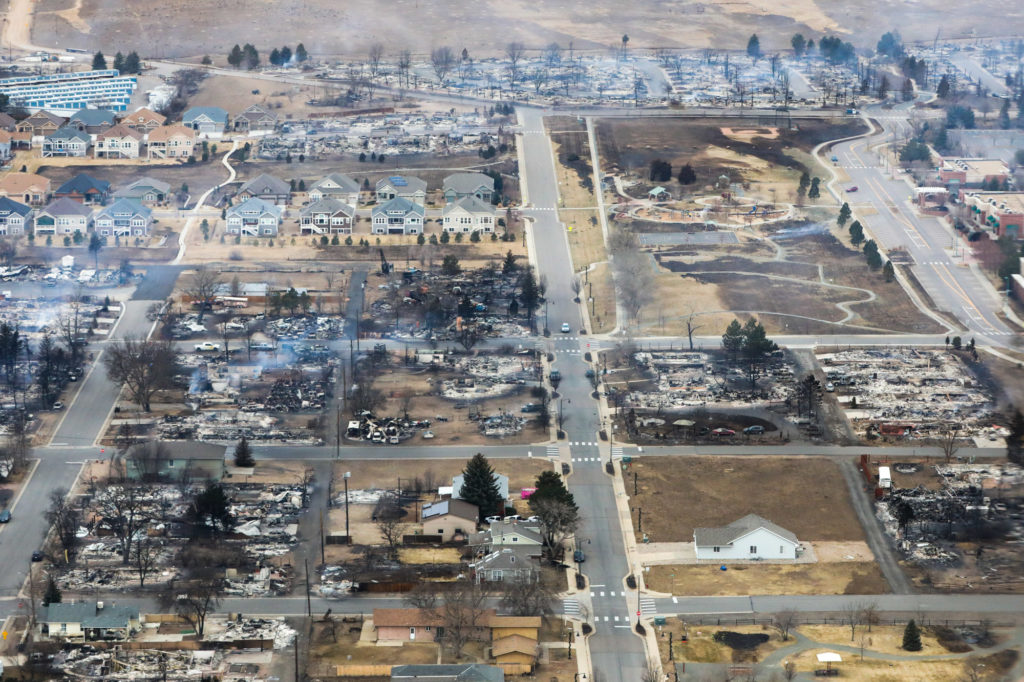Right now, the idea is being proposed as an amendment to an existing Senate bill that creates a new climate preparedness office and expands other disaster recovery programs. But lawmakers are in their final days of work this year, and pushing this forward will likely not be easy.
“I think local governments are really not excited about the state telling them what their building code should be,” Senate Majority Leader Dominick Moreno, D-Commerce City, said during a recent briefing with capitol reporters.
The proposal for a wildland code board came out of the fire commission’s Wildland Urban Interface Subcommittee, a group comprised of fire and safety officials as well as representatives of local governments and business interests. The group was convened at the request of Gov. Jared Polis, who the commission to evaluate the best regulatory and “incentive-based” options for land-use planning, development and building resilience in wildfire-prone areas.
The subcommittee envisioned the board taking two years to adopt a suite of minimum wildfire regulations, develop policies and procedures and hold public hearings on proposed rules. It would then determine a timeframe for enacting the new rules and set deadlines for local governments to comply.
Parts of the proposal are already drawing fire.
The proposal has yet to get anywhere at the legislature but it’s already getting pushback from groups that wield a lot of influence under the gold dome.
Kevin Bommer, executive director of the Colorado Municipal League, said the organization supports the idea of a new state board that would disseminate model wildfire building and land-use standards and offer incentives, guidance and training for cities and towns that want to enact them.
“I think it’s great to have the voices, but if we’re talking a board that has enforcement authority over local governing bodies, then that’s a loser,” Bommer said.
Colorado Counties, Inc., a non-profit representing county commissioners, took part in the subcommittee meetings where the wildfire code board proposal was crafted. Executive Director John Swartout said the organization’s members have not yet taken a formal position on the proposal and related legislative amendment but noted state mandates are often difficult for counties with land-use authority.
“That said, we have worked hard to see if we can find an appropriate balance,” Swartout said.
In a statement, Ted Leighty, CEO of the Colorado Association of Home Builders, said the organization was reviewing the proposal to make sure it considers any extra costs such regulations could add to home construction, as well as existing efforts by local governments and property owners to reduce wildfire risk.
Some wildfire safety experts, including the National Fire Protection Association, say voluntary actions by individuals and communities aren’t enough to counter increasing wildfire danger fueled by climate change and population growth. They advocate for mandatory statewide building and planning regulations.
Statewide wildfire regulations could also make Colorado more competitive for some grants from the Federal Emergency Management Agency which favor states that have adopted them, said state Sen. Chris Hansen, D-Boulder.
In January, Hansen said Colorado had applied for, but failed to win, more than $50 million in federal grant money.
A handful of states already have mandatory statewide wildfire planning and building codes. Among those, only four have ones written explicitly for the wildland-urban interface, according to the Insurance Institute for Business and Home Safety. Around the country, scores of local governments — including Boulder, which was devastated in late December by the Marshall fire, now considered the most destructive in Colorado history — have enacted rules designed to harden communities against wildfires.
Less-strident moves toward statewide wildfire planning and building codes in Colorado have been defeated in the past.
After a devastating season of wildfires in 2012 that left six people dead and more than 640 buildings destroyed, a state task force recommended Colorado create a model ordinance for homes built in areas at risk for wildfires that would either be mandatory in high-risk areas or could be required by local governments. That effort petered out under pressure from home builders’ organizations.
The latest approach would hand a wide range of powers to the proposed wildfire code board. It would certify local officials and contractors to carry out inspections, collect fees and provide technical assistance. Once certified, local governments would enforce the minimum statewide wildfire regulations within their jurisdictions.
The board would also establish a procedure for considering modifications to the statewide standards. The board itself would act as the enforcement authority in places without local code officials and in areas that are “unable or unwilling” to enforce the wildfire regulations under the proposal approved by the fire commission.
The board’s members would likely include fire and emergency authorities, building code and home building professionals, land-use experts and local government officials, under the proposal recommendation approved by the fire commission.
Even if the proposal for the new wildfire code board survives the legislative gauntlet largely intact, and even if it were then signed into law by a governor whose administration often favors incentives over regulations on environmental matters, it will have to clear other practical hurdles. One is the lack of a single, agreed-upon map establishing the boundaries of Colorado’s wildland-urban interface that would outline which areas must comply with new wildfire regulations.
CPR reporters Bente Birkeland and Veronica Penney contributed to this story.
